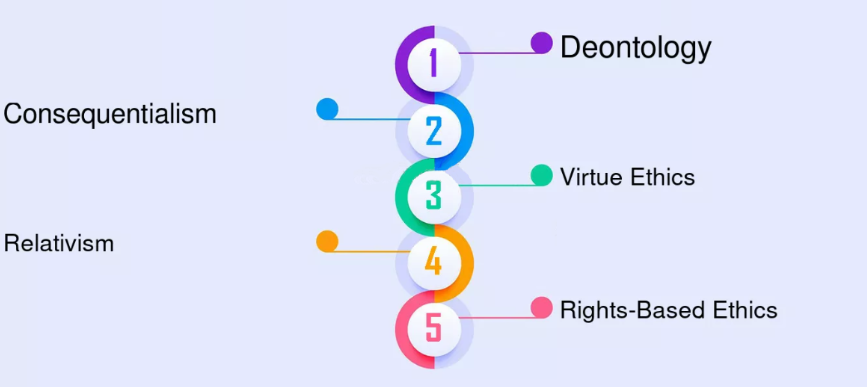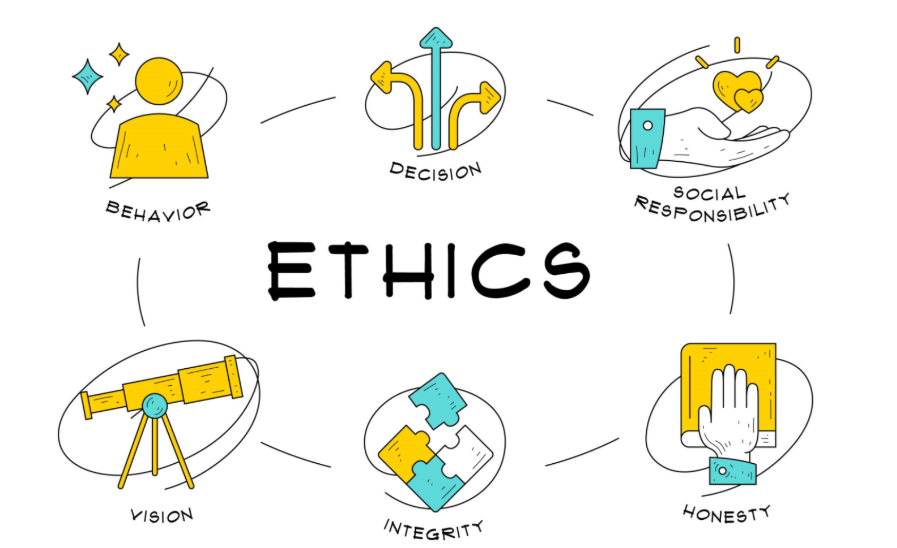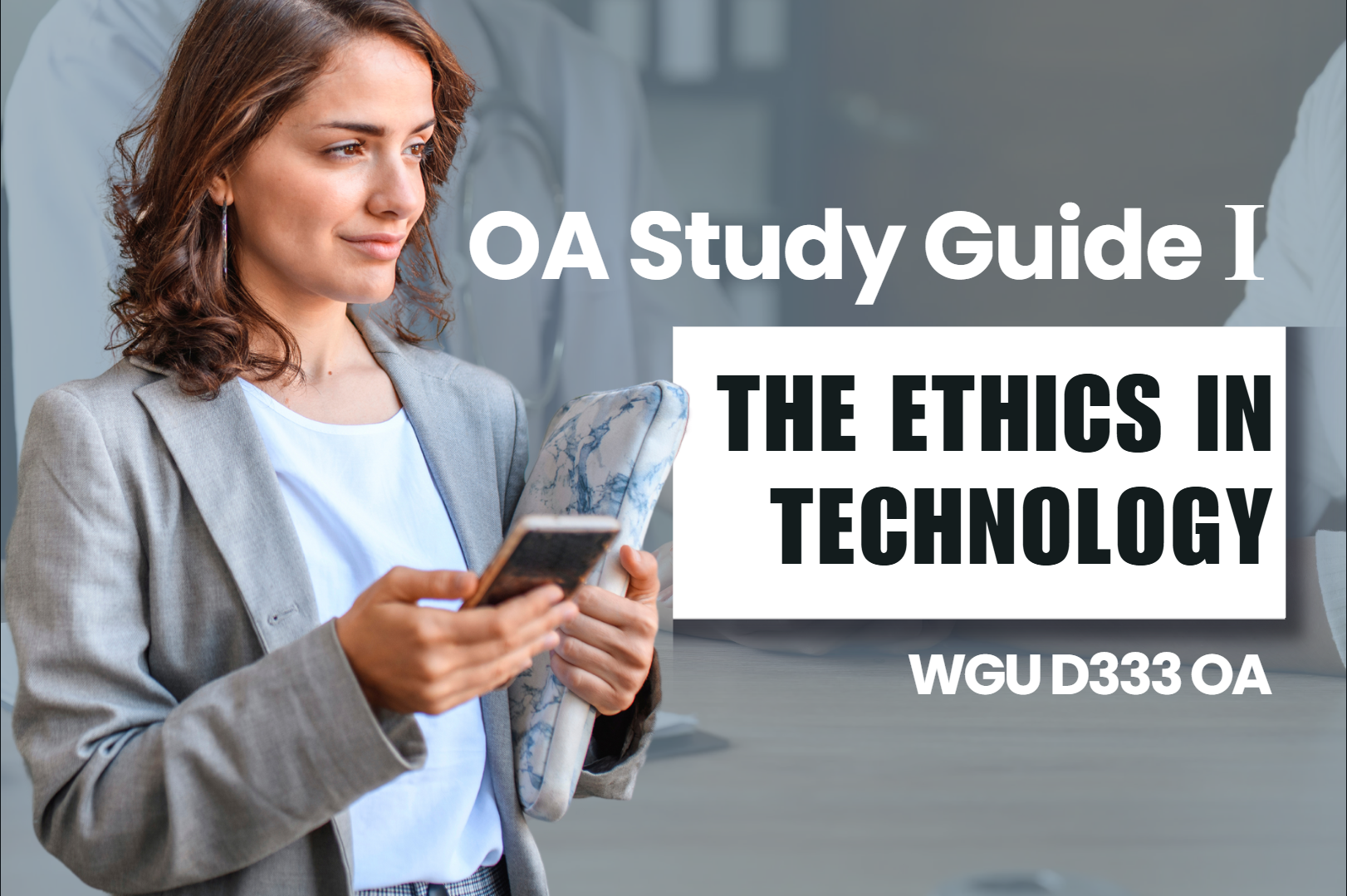WGU D333 OA Study Guide I - 2025 | The Art of Ethical Engineering📖
Picture this: you’re a software engineer crafting an app that could change lives. Sounds exciting, right? But wait—what happens when a tricky ethical dilemma pops up? Should you prioritize user safety, your client’s demands, or the team’s deadlines? It’s a lot to juggle! That’s where understanding ethics in technology, especially the Software Engineering Code of Ethics and broader ethical frameworks, becomes your superhero toolkit.
This article explores essential ethical frameworks and their application in software engineering:
- Ethical Frameworks (Deontology, Consequentialism, Virtue, Relativism): These four ethical frameworks—Deontology (duty-based ethics), Consequentialism (focus on outcomes), Virtue ethics (character development), and Relativism (cultural context)—offer different perspectives on moral decision-making.
- Software Engineering Code of Ethics: The Software Engineering Code of Ethics outlines the professional responsibilities of software engineers, emphasizing public safety, honesty, and accountability in the development and deployment of software.
Why should you care? Well, in a world where technology is everywhere, understanding these principles isn’t just about passing your WGU D333 OA questions (although that’s a nice bonus). It’s about making sure your work leaves a positive mark on the world. So, grab your metaphorical cape, and let’s explore how ethics can turn you into the hero of your own tech story!
How to Use This Guide for the WGU D333 OA Exam?📖
The D333 Ethics in Technology OA exam at WGU evaluates your understanding of ethical theories, professional conduct, and decision-making in technology. This guide simplifies the key concepts of ethical frameworks (Deontology, Consequentialism, Virtue, Relativism) and the Software Engineering Code of Ethics to help you grasp the topics tested in the exam.
We also provide exam-style questions and practical applications to ensure you’re fully prepared for the questions on the WGU D333 OA exam.

Ethical Frameworks: Exploring Deontology, Consequentialism, Virtue Ethics, and Relativism For D333 OA📝
Living in a world that is developing at a very high pace it is crucial to be familiar with ethical theories let alone when it comes to technology. They are the tools that lead us to understand moral choices and determine whether or not certain actions are right or wrong. In this section, we’ll dive into four major ethical frameworks: Deontology, Consequentialism, Virtue Ethics, and Relativism. To provide a better understanding of these concepts, let us discuss them one by one and their suitability in day-to-day life.
What is Deontology?
Deontology focuses on rules and duties. This kind of ethical approach is aimed at pointing out that some operations are moral or immoral independently of the consequences they bring about. The central idea of the work is to obey the existing rules or duties because they are the basis of ethics with which people have to be equipped. This approach is usually described this way: “The right thing is to do the right thing at the right cost, regardless of the price.” According to any deontological theories, moral rules are strict Regulations, that never can be influenced and always should be obeyed regardless of the circumstances.
Key Ideas of Deontology
- Moral Absolutism: Some actions, like telling the truth, are always right, while others, like lying, are always wrong, regardless of the situation. This principle ensures consistency in ethical decision-making.
- Categorical Imperative: This idea was advanced by the well-known German philosopher Immanuel Kant. He said that one should do to others what one would expect others to do to him. For example if lying is sinful, then every time one is required not to tell the truth because it cannot be right always.
Examples of Deontology in Action
- Honesty: Think about it when someone asks if you have taken their pencil for instance. Hearing, so even if owning up to it will get you into trouble, because the important rule of honesty is that you must always tell the truth otherwise people will not trust or respect you.
- Respect for Persons: If you promise to help a friend with homework, breaking that promise would disrespect their trust, so keeping your word is the right thing to do as it upholds the duty of honoring commitments.
What is Consequentialism?
Consequentialism evaluates the morality of an action based on its outcomes or consequences. This makes it means that the outcome of an action defines the ethical value of that action. This framework requires us to look at the big picture and strive to produce the greatest net amount of benefit to the largest number of people. It is a practical moral theory and most of the time it has implications concerning the measurement of the risks and gains of a particular act.
Key Ideas of Consequentialism
- Utilitarianism: Let’s say a company comes up with a new application that assists millions of users but a few employees do extra work. The general pleasure that the app will bring might still overcome the demerit and therefore might be ethical from a utilitarian point of view.
- Cost-Benefit Analysis: Weighing the positive and negative outcomes of a decision to determine which action is better. This method is widely used in business and technology to evaluate ethical choices.
Examples of Consequentialism in Action
- Utilitarianism: Suppose a company introduces a new app that helps millions of people but requires a few employees to work long hours. The overall happiness created by the app might outweigh the drawbacks, making it an ethical choice from a utilitarian perspective.
- Cost-Benefit Analysis: A factory decides to reduce pollution because the long-term benefits of cleaner air, healthier communities, and reduced legal risks outweigh the short-term costs of upgrading equipment.
What is Virtue Ethics?
Virtue Ethics focuses on the character of a person rather than specific actions or their outcomes. It focuses on the values or virtues of total character which are consistent with moral behavior. As opposed to all those frameworks that are based on rules or outcomes and those that consider what kind of car, house, or income is appropriate, virtue ethics simply inquires, “What should I be?” Through the teaching of appropriate character values such as kindness, honesty, and courage people are at times able to make the right ethical decisions instinctively.
Key Ideas of Virtue Ethics
- Aristotelian Virtues: Aristotle, one of the most important philosophers of all time, held that things such as courage and knowledge were the things that make life worth living, ‘eudaimonia’. There is a need to practice virtuous behaviors and thus achieve a flourishing life.
- Moral Character: Being a good person matters more than just following rules or calculating outcomes. Virtues are cultivated through practice and habit, shaping one’s moral character over time.
Examples of Virtue Ethics in Action
- Courage: A firefighter rushing into a burning building to save someone demonstrates courage, a virtue that defines their moral character. Their actions are driven by who they are, not by adherence to rules or the pursuit of outcomes.
- Compassion: Volunteering at a shelter without expecting anything in return reflects compassion. This virtue shows care for others and stems from an individual’s good character.
What is Relativism?
Relativism suggests that morality is not absolute; instead, it depends on culture, society, or personal beliefs. Here, one gets the issue of right and wrong from the relativist point of view, which makes morality elastic. Relativism is liberal since it supports tolerance of opinion diversity recognizing that people around the world and cultures have distinct ethical standards.
Key Ideas of Relativism
- Cultural Relativism: Different societies have their own moral standards, shaped by their history and traditions. Practices and beliefs that seem ethical in one culture may not be viewed the same way in another.
- Moral Subjectivism: Individuals determine what is right or wrong based on personal preferences and feelings. This perspective emphasizes that morality is a personal matter and can vary from person to person.
Examples of Relativism in Action
- Cultural Practices: In some cultures, arranged marriages are considered ethical, while others might view them differently. Relativism respects these differences by recognizing that moral standards are influenced by cultural norms.
- Personal Beliefs: Someone might believe it’s acceptable to tell a small lie to protect a friend’s feelings, reflecting their personal moral code. Relativism acknowledges that individual perspectives play a role in shaping ethical decisions.
How These Frameworks Compare
Each ethical framework provides a unique way of evaluating moral dilemmas:
- Deontology prioritizes following rules.
- Consequentialism focuses on outcomes.
- Virtue Ethics emphasizes character.
- Relativism recognizes cultural and personal differences.
In the context of technology, these frameworks help address challenges like data privacy, AI ethics, and cybersecurity. For example:
- Deontology might insist on strict user consent policies.
- Consequentialism could weigh the benefits of deploying new technology despite potential risks.
- Virtue Ethics encourages developers to act with integrity and compassion.
- Relativism might consider how different cultures view the use of facial recognition technology.
By understanding these ethical frameworks, students can confidently tackle ethical dilemmas in technology and beyond. Ethics in Technology is an important part of the WGU D333 course, and mastering these frameworks will help students answer WGU D333 OA questions effectively.
Understanding the Software Engineering Code of Ethics For D333 OA📝
Ethics in software engineering can mean one thing: the principles that guide the development of the technology to be appropriate to societal needs. The Software Engineering Code of Ethics, established by ACM and IEEE, lays out principles to guide software engineers in making ethical decisions. Therefore by following the above guidelines, one can avoid difficult issues and hence deal with issues such as; data privacy, user safety, and fairness in technology. We need to expound these principles to identify their significance and use in illustrating realistic situations.
What is the Software Engineering Code of Ethics?
The Software Engineering Code of Ethics therefore serves as a pro forma that aims at seeing that the software engineers should embrace professionalism and ethics while they are conducting their duties. Therefore acceptable business practices stress accountability, integrity, and the prospect of public benefit. Although operating in an industry that impacts millions of people’s lives, these principles are crucial to sustaining public confidence in the profession.
Why is it Important?
- Public Trust: Software is integrated into daily life, from healthcare systems to transportation. Ethical behavior ensures users can rely on these systems.
- Professional Integrity: By following ethical standards, engineers demonstrate honesty and accountability, fostering respect within their teams and organizations.
- Accountability: Clear guidelines provide a benchmark for evaluating actions and decisions, helping engineers avoid misconduct.
The Eight Guiding Principles
The Software Engineering Code of Ethics outlines eight core principles. Each principle addresses a specific area of responsibility to guide engineers in their professional conduct.
1. Public
Public interest should always come first for software engineers. This principle states that engineers should develop software without risks to the user and must be accessible to all users. This demonstrates that in protecting the public’s welfare engineers have to do no harm, report things that may harm, and make their reporting explicit. For example, suppose there is an insecurity in an application; the engineer is expected to make a repair swiftly and notify the users to avert any ill effects.
Example: A firm puts out a patch that corrects a security flaw. Notifying users about this fix is in compliance with the principle of maximizing the public’s benefit.
2. Client and Employer
Engineers should balance their duty to clients and employers with their obligation to the public. This principle highlights the importance of honesty, transparency, and confidentiality in professional relationships. Engineers should only undertake tasks they are qualified to perform, ensure their actions align with public safety, and maintain the trust of their clients by protecting sensitive information.
Example: An engineer refusing to exaggerate their expertise for a project they are unqualified for demonstrates this principle.
3. Product
The principle of product quality emphasizes delivering software that meets the highest professional standards. Engineers are responsible for rigorous testing, comprehensive documentation, and compliance with legal and ethical standards. This ensures that the software is functional, safe, and reliable. Failing to address these aspects could result in harm to users and damage the engineer’s reputation.
Example: Before launching a medical app, engineers conduct extensive testing to ensure accuracy in data tracking and reporting.
4. Judgment
The ability to safeguard the professional judgment means that an analyst is able to make objective decisions which are informed by facts rather than biases of his or her own or other individuals or other forces that may influence her. Another essential applicable rule and regulation within the practice of engineers is the rule of impartiality and Independence. This principle enables their work to impact the people and the standard of the profession is maintained.
Example: An engineer rejects a software feature that can violate user privacy even if that same feature would be a sure source of income for the firm.
5. Management
Ethical management is essential for creating an environment that supports responsible software development. Managers should set realistic goals, ensure fair treatment of all team members, and encourage open communication about ethical concerns. By fostering a positive workplace culture, they can promote both ethical behavior and high-quality outcomes.
Example: A manager encourages open discussions about ethical concerns during project meetings to address potential issues early.
6. Profession
Software engineers should work to uphold and advance the integrity and reputation of their profession. This includes promoting ethical standards, mentoring younger professionals, and reporting unethical behavior. By doing so, engineers contribute to a culture of accountability and excellence within the field.
Example: Reporting a colleague who knowingly ignores data security protocols upholds the integrity of the profession.
7. Colleagues
Collaborating ethically with peers is vital for professional growth and fostering a supportive work environment. This principle emphasizes helping colleagues develop their skills, acknowledging their contributions, and addressing any concerns with fairness and respect.
Example: Sharing knowledge about a new coding framework with team members reflects this principle.
8. Self
Self-responsibility concerns a state of people’s constant education and their personal development of consciousness. Engineering professionals have a professional responsibility to update themselves with new technologies and ethical practices. It is also important to consider personal bias and enhancing of own’s knowledge regarding ethical conduct in the course of the profession`s advancement.
Example: Enrolling in courses on AI ethics demonstrates a commitment to personal and professional growth.
Ethical Dilemmas in Software Engineering
Ethical challenges often arise in software engineering. Here are a few examples:
- Data Privacy: Balancing user data collection with privacy rights.
- Algorithmic Bias: Ensuring fairness in AI systems.
- Intellectual Property: Respecting copyright laws while fostering innovation.
Case Study: A social media company faced backlash for using user data without proper consent. Revising its policies to prioritize transparency and user control resolved the issue and restored trust.
Applying Ethical Frameworks
Frameworks like the PAPA Model (Property, Access, Privacy, Accuracy) provide a structured approach to addressing ethical issues. Engineers can use these tools to:
- Evaluate potential risks and benefits.
- Make decisions that align with ethical standards.
Why Lifelong Learning Matters
The technology landscape evolves rapidly, and so do ethical challenges. Staying informed through:
- Courses and Workshops: Keep skills and knowledge up to date.
- Industry Resources: Engage with forums, articles, and webinars.
By embracing the principles of the Software Engineering Code of Ethics, engineers can confidently navigate the complexities of their field while maintaining trust, integrity, and accountability. Adhering to these principles is not just beneficial for passing WGU D333 OA questions but also essential for building a responsible and ethical future in technology.
Tired of reading blog articles?
Let’s Watch Our Free WGU D333 Practice Questions Video Below!

Conclusion: Mastering Ethics for WGU D333 and a Brighter Tech Future📄
You’ve now gained the knowledge, that ethics is not just a trend in software engineering; it’s the guideline to help you create a positive impact. The Software Engineering Code of Ethics gives clear guidance to enable you to understand relationship issues, the quality of the products, and the public interest. However, ethical theories such as Deontology and Consequentialism assist in providing a different consideration as well as a solution to moral conflict situations.
Why does this matter? Beyond making you a more responsible professional, mastering these concepts is essential for your success in the WGU D333 OA. These topics are likely to be tested in the final assessment, so taking the time to understand them thoroughly will pay off—not just for your exam but for your career.
So, what’s next? Dive into the details, practice applying these principles, and don’t hesitate to revisit this guide when you need clarity. Remember, ethical engineers don’t just build software—they build trust, fairness, and innovation.
Good luck on your WGU D333 OA journey! You’ve got this, future tech hero!






